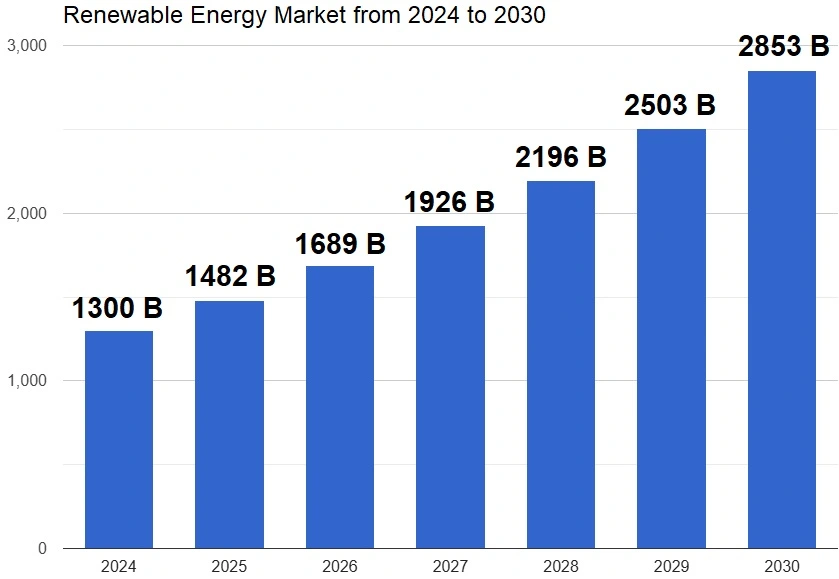The global renewable energy market is experiencing unprecedented growth and transformation, reshaping the world’s energy landscape. Renewable energy sources such as solar, wind, hydro, and geothermal power have emerged as key players in transitioning to cleaner, more sustainable energy systems.
Renewable Energy Market Analysis
The approximate decision of the Techgolly market research team is that the global Renewable Energy market was valued at least USD 1300 billion in 2024. It is projected to reach USD 2853.46 billion by 2030. Growth will continue at a compound annual growth rate (CAGR) of 12% to 14% from 2024 to 2030.

According to Precedence Research, the global Renewable Energy market was valued at USD 1132.46 billion in 2024 and is expected to reach USD 2182.99 billion by 2032. Grand View Research said the market size was USD 1,390 billion in 2024 and is projected to reach USD 3,600 billion by 2030.
Reasons for Market Growth
As the world continues prioritizing clean energy solutions, the renewable energy market is poised for sustained expansion, pivotal in transitioning to a more sustainable and carbon-neutral future. The primary reasons behind the remarkable growth of the renewable energy market are discussed below.
Environmental Concerns and Climate Change
Growing awareness of the environmental consequences of fossil fuel use and the urgent need to mitigate climate change have spurred investments in renewable energy. Renewable sources produce significantly fewer greenhouse gas emissions, making them crucial to global efforts to reduce carbon footprints.
Declining Renewable Energy Costs
Technological advancements, economies of scale, and increased competition in the renewable energy sector have substantially reduced costs. Solar and wind energy, in particular, have become increasingly affordable, making them attractive alternatives to fossil fuels.
Government Policies and Incentives
Governments worldwide have implemented supportive policies, incentives, and subsidies to promote renewable energy adoption. Feed-in tariffs, tax credits, and portfolio standards encourage businesses and individuals to invest in renewable energy projects, driving market growth.
Energy Independence and Security
Diversification of energy sources through renewables enhances energy independence and security for nations. By relying less on fossil fuel imports, countries can mitigate geopolitical risks and ensure a stable energy supply.
Technological Advancements
Ongoing research and development in renewable energy technologies have improved efficiency, energy storage, and grid integration. These advancements increase the reliability and effectiveness of renewable energy systems, attracting further investments.
Job Creation
The renewable energy sector has become a significant source of employment. From manufacturing solar panels to installing wind turbines and maintaining hydroelectric facilities, the industry generates jobs in various fields, contributing to economic growth.
Energy Access in Developing Nations
Access to reliable electricity is limited in many developing nations. Renewable energy offers a scalable, cost-effective solution to power remote and underserved communities, bridging the energy access gap.
Corporate Sustainability Initiatives
Many corporations are committing to sustainability goals, including using renewable energy to power their operations. This corporate demand for renewable energy has driven investment in renewable power generation projects.
Resilience and Grid Integration
Renewable energy systems enhance grid resilience when integrated with smart grid technologies and energy storage solutions. They can provide power during grid disruptions and contribute to a more reliable and adaptive energy infrastructure.
Public Support and Consumer Demand
Public awareness of environmental issues and the desire to reduce personal carbon footprints have driven consumer demand for renewable energy options. Many individuals and households invest in rooftop solar panels and other renewable technologies.
Key Market Players
The major Renewable Energy vendors are General Electric, Schneider Electric SE, Acconia S.A., Enel Spa, The Tata Power Company Ltd., Innergex Renewable Energy, Suzlon Energy Ltd., Invenergy, ABB Ltd., Xcel Energy Inc., Siemens Gamesa Renewable Energy SA, and National Grid Renewables.
Conclusion
The renewable energy market is on an accelerated growth trajectory, driven by environmental concerns, technological advancements, and strong policy support. With declining costs, increased public and corporate demand, and global efforts to achieve energy independence and carbon neutrality, renewables are becoming central to the energy transition. This shift promises to address climate change and energy security and generate economic benefits through job creation and increased energy access. As investments and innovations continue, the renewable energy sector is set to redefine the global energy landscape, paving the way for a more sustainable and resilient future.





